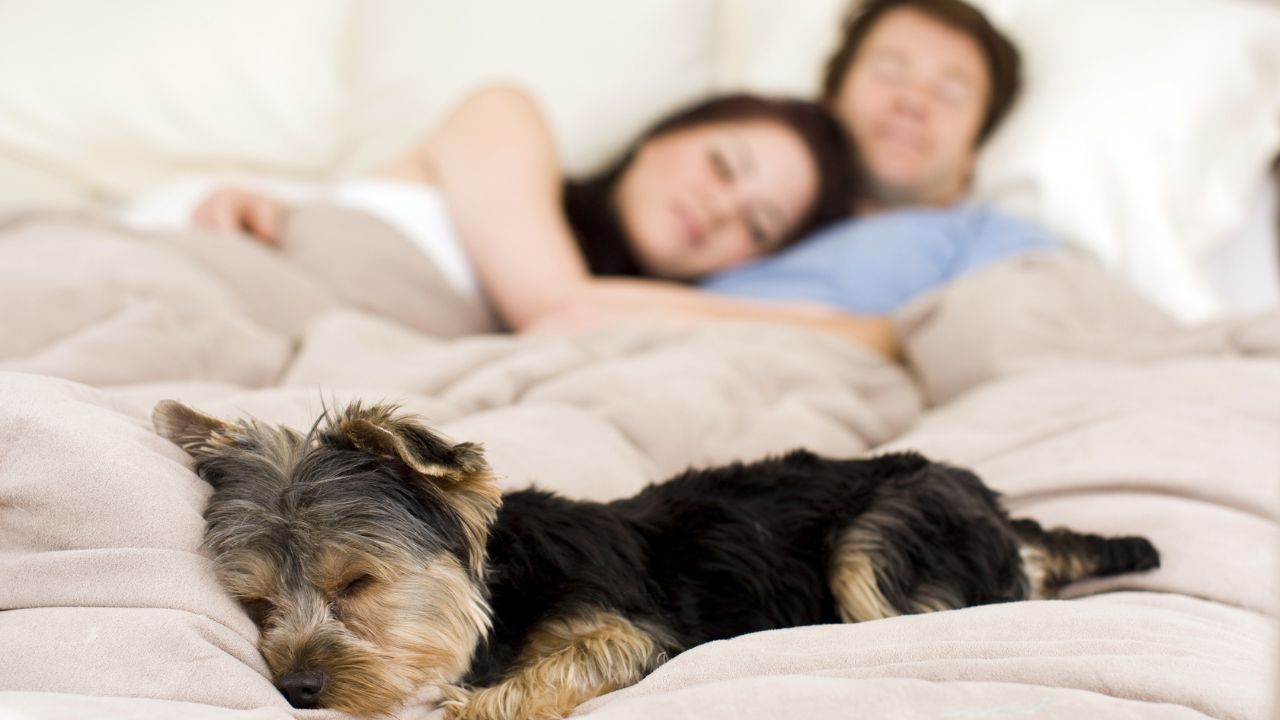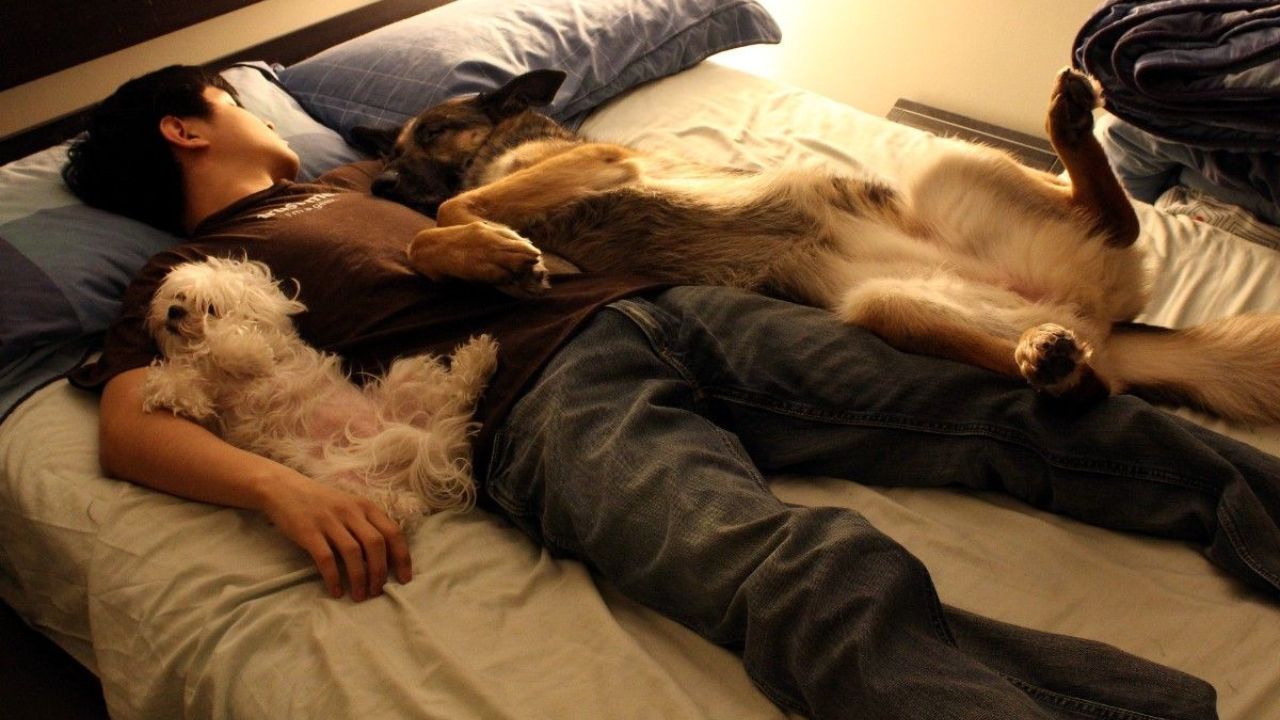Bringing a new puppy into your home is an exciting and adorable experience. But it also presents a good number of difficulties, like sleepless nights. Just like human babies, puppies need time to adjust to their new surroundings and develop a regular sleep pattern.
If you’re wondering how long it takes a puppy to sleep through the night, you’ve come to the right place. This article explores the average age at which puppies can sleep through the night and provides tips to help your furry friend settle into a peaceful slumber.
Average Age for Puppies to Sleep Through the Night
Like human infants, puppies have small bladders and limited control over their bodily functions. As a result, they require frequent trips outside to relieve themselves, even at night. However, with time and proper training, most puppies can learn to sleep through the night without going outside.
According to experts, the average age at which puppies can sleep through the night is around four months or sixteen weeks old. By this age, they have developed better bladder control and can hold their urine longer. However, it’s important to note that individual puppies may vary in their development and may take a little longer to reach this milestone.
The average age for puppies to sleep through the night is around four months or sixteen weeks old. At this stage, most puppies have developed better bladder control and can hold their urine for longer periods. However, it’s important to note that individual puppies may vary in their development and may take a little longer to reach this milestone. By following proper training and establishing a consistent routine, you can help your furry friend settle into a peaceful slumber.
Advice on How to Get Your Dog to Sleep Through the Night

How long until puppy sleeps through night, While waiting for your puppy to reach the age when they can sleep through the night, there are several things you can do to promote better sleep habits. Here are some helpful tips:
Establish a Consistent Bedtime Routine
Creating a consistent bedtime routine promotes healthy sleep habits and improves overall well-being. A regular nighttime routine can help your body know when to relax and prepare for a good night’s sleep. This could be as simple as dimming the lights, reading a book, taking a warm bath, or practising relaxation techniques. If you follow this routine regularly, your body will associate these actions with sleep. This will facilitate falling and staying asleep through the night. A consistent bedtime routine can be a game-changer for achieving quality sleep and waking up refreshed in the morning.
Provide a Comfortable Sleeping Environment
Creating a comfortable sleeping environment for your puppy is crucial for a restful night’s sleep. Ensure that their sleeping area is warm, quiet, and free from distractions. Consider using a cosy dog bed or crate with soft bedding to provide security and comfort.
Consider temperature, lighting, and noise levels to optimize your sleep space. Choose a supportive mattress and pillows that suit your preferences and provide proper alignment for your body. Use soft and breathable bedding materials to enhance comfort. Keep the room well-ventilated and at a comfortable temperature. Minimize noise and light disturbances using curtains, earplugs, or white noise machines. By prioritizing a comfortable sleeping environment, You can raise the calibre of your sleep so that you awaken feeling renewed and energized each morning.
Limit Food and Water Intake Before Bedtime
To minimize the likelihood of nighttime accidents, managing your puppy’s food and water intake before bedtime is important. Avoid giving your puppy large meals or excessive amounts of water close to bedtime. Instead, offer smaller meals earlier in the evening and remove water a few hours before bedtime. This will help reduce the need for frequent bathroom breaks during the night.
Limiting food and water intake before bedtime can significantly impact the quality of your sleep. Consuming large meals or excessive fluids close to bedtime can disrupt digestion and increase the likelihood of nighttime trips to the bathroom. Avoiding heavy meals and limiting water intake at least two hours before bed is generally recommended. By implementing this practice, you can reduce the chances of discomfort, indigestion, and interruptions during sleep, enabling a more uninterrupted and peaceful night’s sleep.
Gradually Extend the Time Between Bathroom Breaks

If your puppy is still too young to sleep through the night, you can gradually increase the duration between their bathroom breaks. Start by setting a timer and taking them outside every few hours. As they get older, gradually increase the interval between breaks to encourage bladder control and longer periods of sleep.
Gradually extending the time between bathroom breaks, also known as bladder training, can effectively regain control over urinary frequency and improve bladder function. This method involves incrementally increasing the intervals between visits to the bathroom, allowing the bladder to stretch and hold more urine over time. By delaying urination when the urge arises and gradually lengthening the time before emptying the bladder, individuals can train their bladder to become more resilient and reduce the frequency of bathroom trips. Bladder training techniques are recommended by medical sources such as WebMD, Cleveland Clinic, and Harvard Health, among others, and can be beneficial for managing urinary incontinence or overactive bladder.
Use Positive Reinforcement for Good Behavior
When your puppy successfully sleeps through the night without any accidents, reward them with praise and treats. Positive reinforcement will reinforce the desired behaviour and motivate your puppy to sleep soundly.
Positive reinforcement for good behaviour is a powerful technique to encourage and reinforce desired actions. By providing rewards, praise, or incentives for positive behaviours, individuals are more likely to repeat those behaviours in the future. Positive reinforcement can be applied in various settings, such as parenting, education, and workplace environments. This approach focuses on highlighting and acknowledging the strengths and accomplishments of individuals, creating a supportive and motivating atmosphere. Positive reinforcement encourages individuals to exhibit desired behaviours, leading to personal growth, increased productivity, and improved relationships.
Be Patient and Consistent
Remember that every puppy is unique, and the time it takes to sleep through the night may vary. It’s essential to be patient and consistent with your training efforts. Establishing a routine, providing a comfortable sleeping environment, and using positive reinforcement can help your puppy develop healthy sleep habits over time.
Being patient and consistent is essential when working towards goals or challenges. Patience allows for the understanding that progress takes time and setbacks are a natural part of the process. Individuals can establish positive habits and build momentum towards their objectives by maintaining consistency in actions and efforts. Whether learning a new skill, overcoming obstacles, or reaching long-term goals, patience and consistency are key ingredients for success. By staying committed and persistent, individuals can navigate through difficulties, adapt to changes, and ultimately achieve their desired outcomes. Remember, Rome wasn’t built in a day, and great things come to those who persevere.
Conclusion
How long until puppy sleeps through night, While puppies typically learn to sleep through the night around four months of age, it’s important to note that each puppy is an individual and may take longer to reach this milestone. Following the tips mentioned above and providing a nurturing environment can help your puppy establish good sleep habits and enjoy peaceful nights together.
FAQ
At What Age Can Puppies Sleep Through the Night without Peeing?
How long until puppy sleeps through night, If you manage the first couple of weeks well, it can happen surprisingly quickly – with some puppies sleeping through the night as early as 12 weeks old. Some, however, can take a lot longer (especially small breed puppies), so remember each pup is different, and they all require your patience.
How Do I Get My Puppy to Sleep Through The Night?
How long until puppy sleeps through night, Create a routine for going to bed. You’ll get better sleep if you establish a routine for the puppy early on and teach them that nighttime is for sleeping. Limit the dog’s water and food intake for a few hours before bedtime. Before bed, play, cuddle, and take them outside to relieve themselves.
Do Dogs Sleep All Night Like Humans?
Dogs are diurnal animals, meaning they sleep mostly at night like humans. Unlike humans, dogs are polyphasic sleepers, meaning they sleep for several periods during the day. Generally speaking, dogs sleep for 45 minutes at a time. While humans typically sleep for seven or nine hours.
Why Should You Never Wake a Sleeping Puppy?
Waking a sleeping dog is likely to make the dog startled and disoriented. Ensure visitors and children know not to bother sleeping dogs to prevent bites. Waking a sleeping dog can lead to even well-socialized and otherwise friendly dogs snapping or biting.

